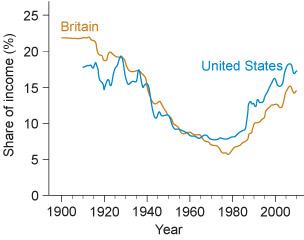3.3 Imagining better law and better life
Can equity transcend this socio-economic landscape? There certainly appears to be something enduring about equity, and the notions of justice and fairness it enfolds, that suggests it can. Recall, for example, equity’s association with the Golden Rule; that powerful moral and ethical measure mentioned earlier. Furthermore, Ellul says that ‘men of law have certain scruples and are unable to eliminate justice from the law completely without twinges of conscience’ (1964, p. 295). So, does this suggest that capitalism and its stakeholders, or whatsoever seeks to reshape the socio-legal landscape for its own ends at a given moment in time, cannot hope to have everything their own way? Does it mean that justice or equity are able to effect a real influence over capitalism?
If you consider opportunism as not just symptomatic of capitalism, but actually paradigmatic of all that is rotten about capitalism, what does this reveal about equity and its relationship to capitalism? Smith, for one, believes equity holds the key to dealing with opportunism (2012, p. 12). And it may be assumed that this belief extends to large-scale crises, as much as it does to small-time frauds that bear the hallmarks of opportunism. Smith, moreover, notes equity’s philosophical foundations in achieving this outcome. ‘Equity’, Smith maintains, ‘seeks individualized justice in which opportunism has no scope for exploiting the defects of the law that stem from its generality (Aristotle’s concern again)’ (2012, p. 27). Equity, in this sense, still demonstrates something of the notable flexibility or elasticity that Aristotle first highlighted via the image of the lesbian rule, that is it bends to fit the exact contours of a given situation. However, as noted earlier, Smith does not concern himself with equity as a mode of capitalist critique. Therefore following Smith’s optimism to a logical conclusion may only lead to the further entrenchment of capitalist values freed from or unperturbed by the threat of opportunism.

